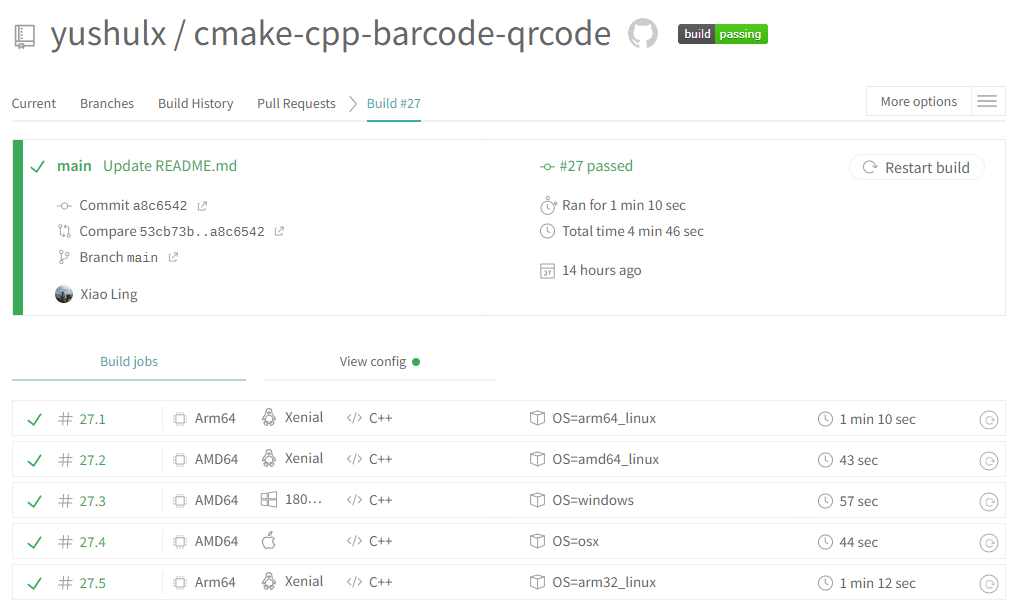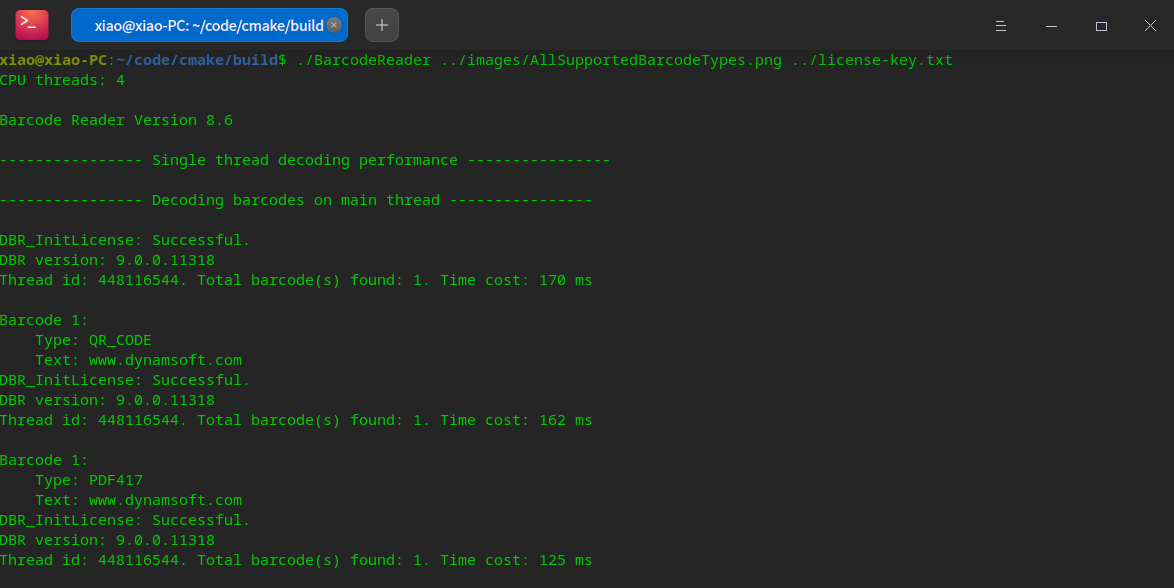Building Command-line Barcode and QR Code Reader in C++
Dynamsoft Barcode Reader SDK supports development of barcode and QR code scanning applications for desktop, mobile and web platforms. The version 9.0 of the SDK is coming to all platforms in the following weeks. The C++ SDK is available for download today. As an enterprise-class C++ barcode and QR code scanning SDK, Dynamsoft Barcode Reader supports building desktop and server applications for Windows, Linux, macOS, Raspberry Pi and Jetson Nano. This article helps developers to build barcode and QR code reading applications in C and C++.
This article is Part 5 in a 12-Part Series.
- Part 1 - CMake: Build C++ Project for Windows, Linux and macOS
- Part 2 - Insight Into Dynamsoft Barcode SDK Decoding Performance
- Part 3 - Building ARM64 Barcode and QR Code Scanner on Nvidia Jetson Nano
- Part 4 - How to Decode QR Code on Mac with Apple Silicon
- Part 5 - Building Command-line Barcode and QR Code Reader in C++
- Part 6 - How to Build Linux ARM32 and Aarch64 Barcode QR Scanner in Docker Container
- Part 7 - How to Link MSVC DLLs with MinGW GCC in Windows
- Part 8 - Transforming Raspberry Pi 4 into a Barcode Scanner with a C++ App, USB Camera, and OLED Display
- Part 9 - Building Windows Desktop Barcode Reader with Win32 API and Dynamsoft C++ Barcode SDK
- Part 10 - How to Build a Command-Line Barcode Reader with Rust and Dynamsoft C++ Barcode SDK
- Part 11 - How to Decode Barcode and QR Code from WebP Images in C++ and Python
- Part 12 - Building a Desktop C++ Barcode Scanner with Slimmed-Down OpenCV and Webcam
About Dynamsoft C++ Barcode and QR Code Reader SDK
SDK Download
SDK License
Click here to get a trial license. You can set the license key as follows:
C
char errorBuf[512];
DBR_InitLicense("LICENSE-KEY", errorBuf, 512);
void* barcodeReader = DBR_CreateInstance();
C++
char errorBuf[512];
dynamsoft::dbr::CBarcodeReader::InitLicense("LICENSE-KEY", errorBuf, 512);
CBarcodeReader* reader = new CBarcodeReader();
Note: you must set the license key globally before initializing the barcode reader object.
A Command-line C++ Barcode and QR Code Reader for Multiple Platforms
To conveniently build our C/C++ application on different platforms, we create a CMake project. In the CMakeLists.txt file, we specify the target platform and the corresponding build configuration. The most complicated part is to distinguish x64, ARM32, and ARM64 Linux distributions via CMAKE_SYSTEM_PROCESSOR:
MESSAGE( STATUS "CPU architecture ${CMAKE_SYSTEM_PROCESSOR}" )
if(WINDOWS)
if(CMAKE_CXX_COMPILER_ID STREQUAL "GNU")
link_directories("${PROJECT_SOURCE_DIR}/platforms/win/bin/")
else()
link_directories("${PROJECT_SOURCE_DIR}/platforms/win/lib/")
endif()
elseif(LINUX)
if (CMAKE_SYSTEM_PROCESSOR STREQUAL x86_64)
MESSAGE( STATUS "Link directory: ${PROJECT_SOURCE_DIR}/platforms/linux/" )
link_directories("${PROJECT_SOURCE_DIR}/platforms/linux/")
elseif(CMAKE_SYSTEM_PROCESSOR STREQUAL armv7l OR ARM32_BUILD)
MESSAGE( STATUS "Link directory: ${PROJECT_SOURCE_DIR}/platforms/arm32/" )
link_directories("${PROJECT_SOURCE_DIR}/platforms/arm32/")
elseif(CMAKE_SYSTEM_PROCESSOR STREQUAL aarch64)
MESSAGE( STATUS "Link directory: ${PROJECT_SOURCE_DIR}/platforms/aarch64/" )
link_directories("${PROJECT_SOURCE_DIR}/platforms/aarch64/")
endif()
elseif(MACOS)
MESSAGE( STATUS "Link directory: ${PROJECT_SOURCE_DIR}/platforms/macos/" )
link_directories("${PROJECT_SOURCE_DIR}/platforms/macos/")
endif()
include_directories("${PROJECT_BINARY_DIR}" "${PROJECT_SOURCE_DIR}/include/")
Since the target platforms include Windows, Linux, macOS, Raspberry Pi, and Jetson Nano, if you do not have theses devices, you can run the test with Travis CI by adding a Travis configuration file to the project:
language: cpp
jobs:
include:
- os: linux
arch: arm64
env: OS=arm64_linux
- os: linux
arch: amd64
env: OS=amd64_linux
- os: windows
arch: amd64
env: OS=windows
- os: osx
arch: amd64
env: OS=osx
- os: linux
arch: arm64
env: OS=arm32_linux
before_install:
- sudo dpkg --add-architecture armhf
- sudo apt-get update
- sudo apt-get install crossbuild-essential-armhf libc6:armhf libstdc++6:armhf
branches:
only:
- main
script:
- mkdir build
- cd build
- if [[ ${TRAVIS_OS_NAME} == "windows" ]]; then
cmake -DCMAKE_GENERATOR_PLATFORM=x64 ..;
else
if [ $OS == "arm32_linux" ]; then
export CC=arm-linux-gnueabihf-gcc;
export CXX=arm-linux-gnueabihf-g++;
export AR=arm-linux-gnueabihf-ar;
cmake -DARM32_BUILD=TRUE ..;
else
cmake ..;
fi
fi
- cmake --build . --config release

Here are the C/C++ coding steps:
-
Include the header files:
#include "DynamsoftBarcodeReader.h" #include "BarcodeReaderConfig.h" -
Set the license key and initialize the barcode reader object:
C
char errorBuf[512]; DBR_InitLicense("LICENSE-KEY", errorBuf, 512); void* barcodeReader = DBR_CreateInstance();C++
char errorBuf[512]; dynamsoft::dbr::CBarcodeReader::InitLicense("LICENSE-KEY", errorBuf, 512); CBarcodeReader* reader = new CBarcodeReader(); -
Decode barcode and QR code from an image file:
C
int errorCode = DBR_DecodeFile(barcodeReader, "image-file", "");C++
int errorCode = reader->DecodeFile("image-file", ""); -
Get the barcode and QR code results:
C
TextResultArray* pResults; DBR_GetAllTextResults(barcodeReader, &pResults);C++
TextResultArray* pResults; reader->GetAllTextResults(&pResults); -
Extract detailed information:
for (int index = 0; index < pResults->resultsCount; index++) { printf("Barcode %d:\n", index + 1); printf(" Type: %s\n", pResults->results[index]->barcodeFormatString); printf(" Text: %s\n", pResults->results[index]->barcodeText); }
Source Code
https://github.com/yushulx/cmake-cpp-barcode-qrcode-mrz
Build and Run
mkdir build
cd build
cmake ..
cmake --build . --config release
./BarcodeReader [image-file] [optional: license-file] [optional: template-file]



